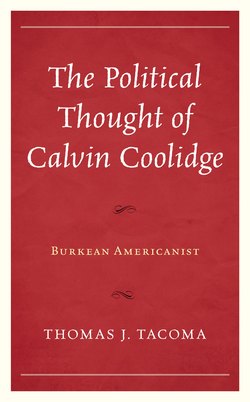Читать книгу The Political Thought of Calvin Coolidge - Thomas J. Tacoma - Страница 19
На сайте Литреса книга снята с продажи.
The Social Gospel
ОглавлениеA final philosophical (or in this case, theological) precondition of Progressive thought, contemporaneous with the Progressive movement, was the emergence of a thickened social gospel theology in the late nineteenth century. As pastors and theologians increasingly confronted the challenges brought to their congregations by the industrial transformations around them, they began to articulate new views of the meaning of Christianity for the modern world. These new conceptions were of a social Christianity, a faith that spoke directly to social ills. This was a Christianity made applicable to the problems of their cities. Social gospel preachers lent the traditional authority of the Christian churches to the proposed reforms of the era; their presence among the Progressives arguably provided a reassuring respectability to the movement and boosted its popular appeal.[47]
The leading American social gospel teachers were Washington Gladden, Richard T. Ely, and Walter Rauschenbusch. Gladden, sometimes referred to as the “the father of the social gospel,” published his Working People and Their Employers in 1876, seeking fairness in labor-capital relations.[48] Gladden, like most other social gospel preachers, was a theological liberal. More influential in developing the social thought and theology of the social gospel movement was Walter Rauschenbusch, professor of Church History at Rochester Seminary. He wrote several volumes explaining and promoting the social approach to Christianity, including Christianity and the Social Crisis (1907), Christianizing the Social Order (1912), and A Theology for the Social Gospel (1917).[49] Another American liberal theologian of the era, Shailer Matthews (Dean of the Chicago Divinity School) wrote Church and the Changing Order in 1907, which was the same year as Rauschenbusch’s first major book was released. This was Progressivism’s prime, and Matthews’ book was hailed “as placing the Social Gospel on a firm scientific footing.”[50]
The key teachings of the social gospel preachers were relatively few. First, they believed that the social principles of the historical Jesus (a reinterpreted version of the biblical Jesus) should be applied to all societies. Second, this historical Jesus taught the immanence of God as Father of all and the corollary idea, the brotherhood of all mankind. Third, social gospel theologians believed that the heart of Jesus’ message was the coming of the Kingdom of God on earth—a realization of the eschaton in human history. Through the active and reforming work of men, progress toward the realization of the Kingdom was possible.[51] Progress was possible, though not automatic. Men (and women) must work to improve conditions on earth to bring it about. As with the other philosophies considered here, the social gospel doctrine rejected the ideas of an unchanging human nature—including the Augustinian understanding of original sin and man’s sinfulness in general—as well as eternal verities of natural law. Indeed, one scholar of the social gospel movement recognized the influence of several key philosophers already named—Hegel, Comte, Darwin, Spencer, and Sumner—as major influences in the development of the social teachings of the social gospel.[52]
Progressivism as a coherent political reform movement emerged from this ideological and intellectual ferment. These philosophical strands—historical thinking and historicism, pragmatism, social Darwinism, positivism, and the social gospel—were interwoven throughout the Progressive thinking of the late nineteenth and early twentieth century. No one philosophy individually constituted Progressivism, but each added to the intellectual gravity of the movement as a whole.
